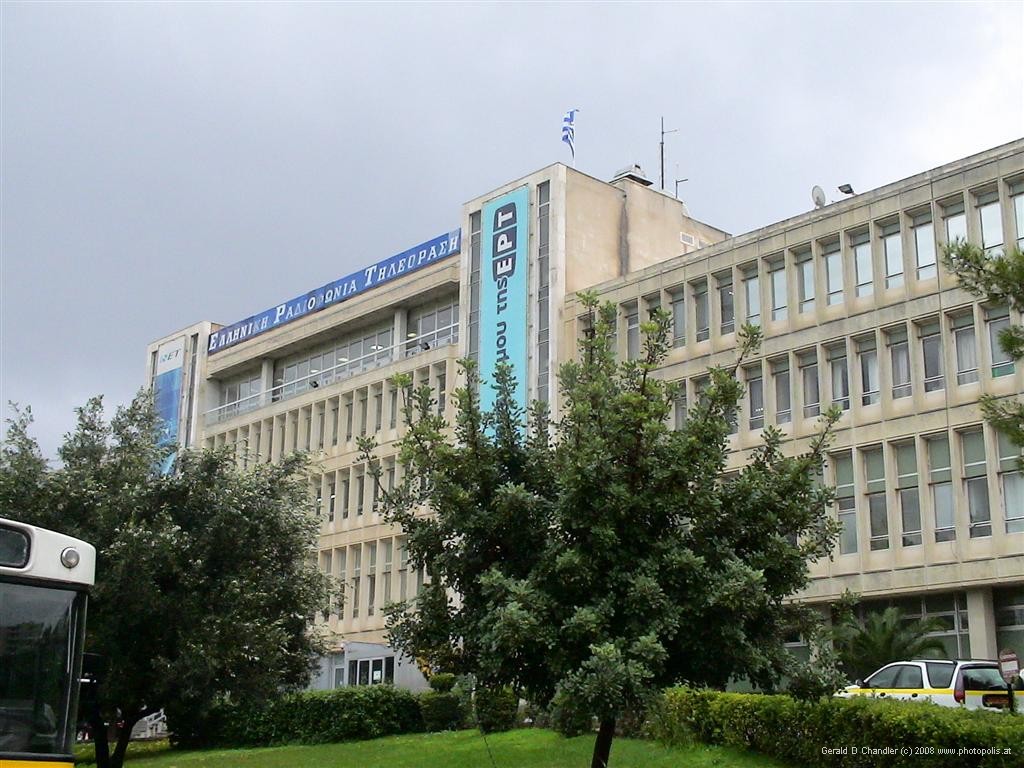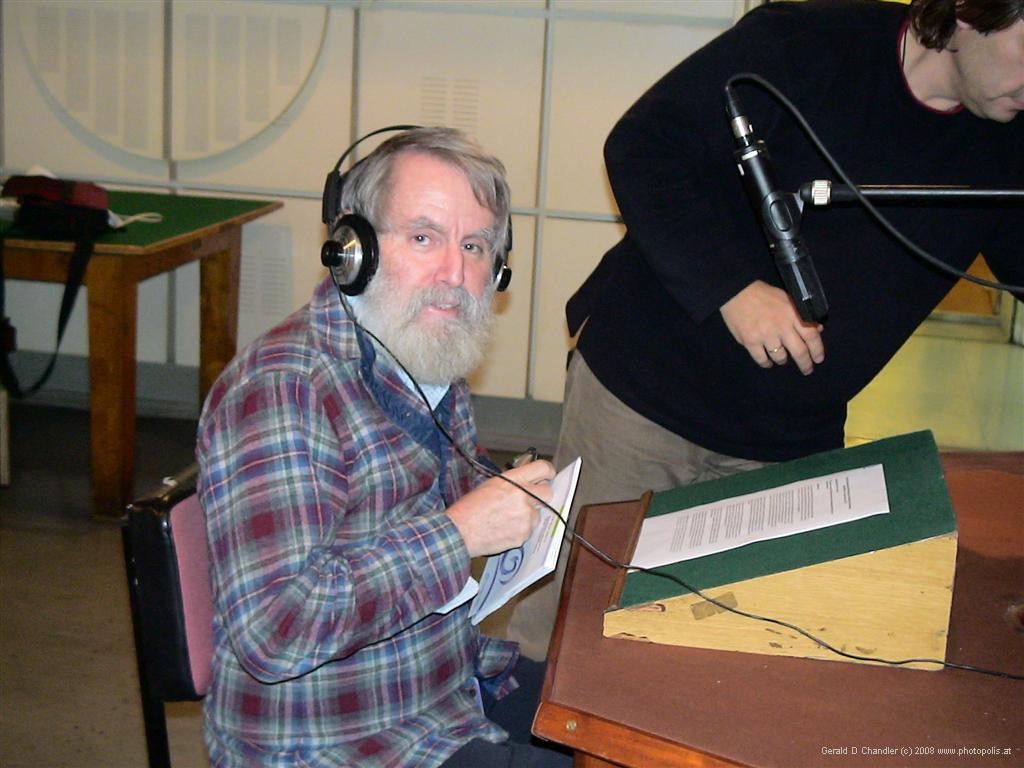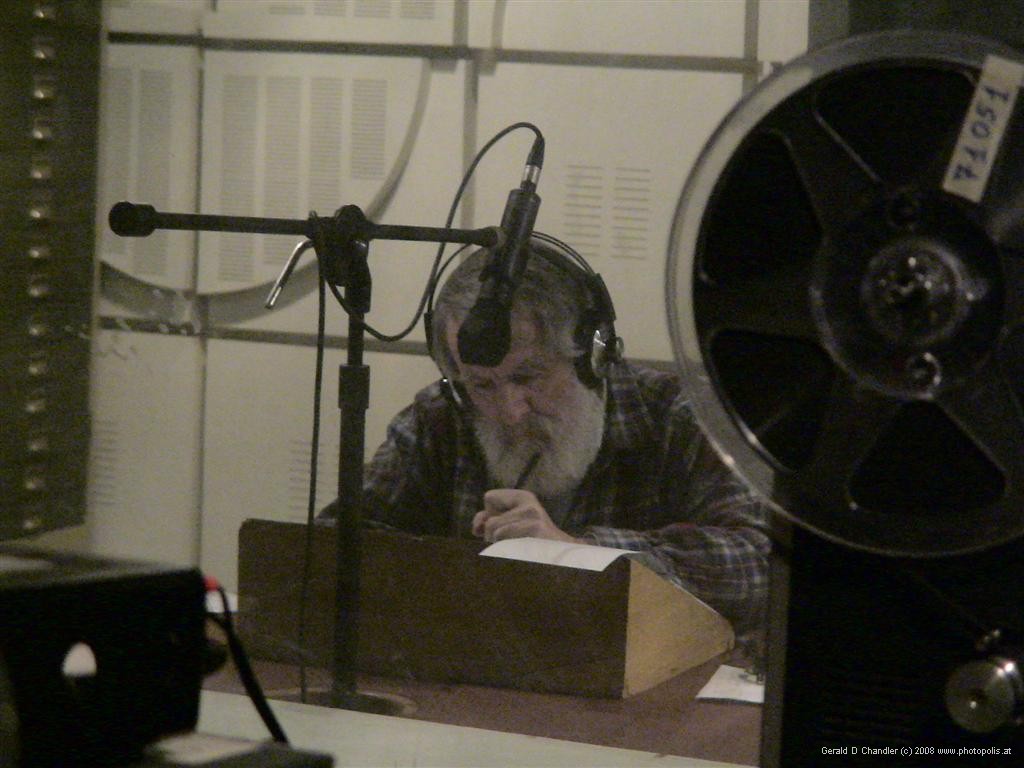Home | Front Page | Index | Blog | New | Contact | Site Map
Acropolis
Agora
History Museums
Myth Art
Olympeion
Piraeus
Roman Forum
Eleusis
3000 Years
Public Affairs
Beach
Spiti (At Home)
Guests
BBC Outlook
Visa Story
Maps
Foto Show
Other Parts of Greece
Greece 2006
Peloponnese
Aegean Islands
Crete 2006

Travel 2006
Greece
Turkey
Thailand
Malaysia
Indonesia
Singapore
Sydney
Travel 2005
Berlin
Paris
Moscow
Russia
Athens
Travel 2004
Mexico 2004
Belize
Guatemala
Honduras
Costa Rica
Panama
Colombia
Ecuador

ERT (Greek Radio Television) Headquarters |
Here's the whole story of my BBC interview:
On Tuesday, November 22, Emma Thomas, the BBC Outlook producer, called me to let me know that the LWOP (Life in prison without parole for minors) program we have been discussing via email would be on Thursday, November 24. It was basically a courtesy call; I hadn't responded to her recent email and she wanted to be sure that I knew as I had given them the incentive to put on the program.
During the call we both re-iterated that I wouldn't be on, but I said that if her planned guests fell through then I would like to be on. About an hour after her first call she called again and said that she had been thinking it over: she thought it would be better to start the program with me giving my views and to end the program with my response to what was said by the two main guests. These were to be Bruce Castor, DA in Pennsylvania, and Liz Brator, legislator in Michigan. I was happy with this and accepted.
I asked if the telephone line I was speaking from was high enough quality. Emma said that she would find a studio in Athens from which I could be interviewed. After one false start this was set as the ERT ('Ellenica Radio & Television) studios.
On Thursday I had to be at the ERT studios by 1:00 p.m. Jan and I wanted to be there at 12:00 to make sure that if we got lost we would have slack. As it turned out Thursday traffic was still perturbed by the biggest rainstorm to hit Athens since 1983 (or so) and the trolley bus drivers decided to have an on-off strike, working only 9:00-1:00 and 3:00-7:00. ERT studios are about 9 km ENE. A fast walker could do it in 90 minutes and with a bike I could do it in 25 minutes. Our trip, via trolley plus a change to a second bus, took 95 minutes. We got into the building at precisely 12:00.
When we got there everything went smoothly: the people at the reception spoke English and guided us up to the office of my "host". There the secretary, Ioanna, spoke English and she took us to Studio B. There, the engineer, Kostas, sort of spoke English and said we were in the right place. Assured, we went to the building cafeteria and had a light lunch. Just on time, 1:15, we got back to Studio B.

Gerry getting ready to be on air |
In the next 15 minutes I was "prepared". Kostas gave me ear phones and sat me at a table with a mike in front of me. Then he connected me to London and soon Emma Thomas came on. Without introduction I recognized her voice. After a few words of small talk Emma reminded me of a point that was on her mind: that I should stick to the topic, LWOP, and not get into what I thought about the BBC's journalism qualities. I agreed.
Emma passed me to Lily, the Outlook engineer. Lily made sure that I could be heard and that I could hear the program. The segment I was to be in was to last 1:30-1:45. I would be on almost 1/3 of that time: 4 minutes and 45 seconds. I was told there would be an introduction and summary that would bring the radio audience up to date; then I would be interviewed for two minutes.Castor and Brator would then be interviewed, and then at the end it would be back to me for 2:45. I was told not to worry about getting in all of my points in the first two minutes. I'd have time to cover anything important at the end. With just a few moments to spare I was on.
Before coming I had tried to anticipate the questions. Actually, I knew the main one: why is LWOP okay? (The original program in October had been based on an Amnesty International - Human Rights Watch report that said LWOP was a violation of human rights.) I'd made a list of my main points and had two or three subpoints under them.

Gerry on air - concentrating very much |
The main presenter is Heather Payton. She came back on after a 3 minutes news bulletin and told some of the background, including playing a shortened version of an interview of Kevin Boyd, now 28 and convicted at 16 for killing his father. After his reprise I was asked: why shouldn't Kevin be considered for parole? I've now forgotten exactly what I said, but Jan tells me I said it brilliantly. Then it was on to Bruce Castor, who defended LWOP and then to Brator, who said that she would be introducing a law in Michigan to eliminate it for under-18s.
Back to me: what did I think? Here I can remember better. I said that I agreed with Castor and summarized his points: every teenager gets a careful hearing before being tried as an adult. As far as I know each year only about 100 teenager murderers out of several thousand are deemed both to have committed a sufficiently grave crime and to be adult enough to warrant adult prosecution and that is reasonable. Heather Payton asked me if I didn't think they could change, as Kevin Boyd had indicated he had. I said one can never know and the danger is high. Prisoners have a great incentive to lie and fake it. I gave two examples: Heather had previously announced that in a few days Outlook would have a program about men who beat their wives. I said that many such men promise to never do it again and then revert to beating. I recalled the incident from earlier this year of the German who ended up in a British mental health center pretending to be an amnesiac. He carried out his subterfuge for six months before he gave up the game.
I said a few other things, but not much. 2:45 is not long! I was thanked and it was over. It was fun. Jan was the most relieved. I was too busy listening to be nervous. Jan was on pins and needles. She flatters me that I did very well.